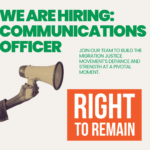By Lisa Matthews, coordinator at Right to Remain.

This week, I ran a workshop with a migrant support group in Liverpool. Many of the group’s members are survivors of gender-based violence or persecution, and most of the members do not yet have secure immigration status.
As well as supporting each other – using mutual aid and self-help approaches – through the barriers, challenges and harm of the UK’s asylum and immigration system, the group also wants to challenge the way the system works, because it is hurting so many people and denying so many people justice.
This makes sense, because the Hostile Environment for migrants is just getting worse and worse. Access to justice is increasingly restricted. And the legal process that people seeking the right to remain need to navigate is increasingly complicated and bewildering. But campaigning to change asylum/immigration law or policy is not straightforward, especially if you do not have secure immigration status.
At the workshop, we discussed what a campaign is, and what it involves. We discussed establishing what you want to achieve, how that can be achieved, who you need to achieve it, and how long it may take. What do you do if you can achieve small wins, but not your overall aim (at first, anyway)? Do you push for those small wins, or does that you further from your ultimate goal? None of this is simple. We talked about how we all have the power to influence people and raise awareness, but only certain people have the direct power to change law or policy. How do we connect these different types of power? And finally, perhaps most importantly, who speaks?
Above all, we explored the benefits and risks of being part of public campaign to change the system when you don’t have secure immigration status yourself. You may feel that by telling your story, you can engage more people in the campaign and make people realise that there are individual human beings being affected by these laws and policies. Telling that story can be fraught with challenges, however.
The benefits of campaigning
Many of the group agreed that there were clear benefits – positive things – that you can get by being part of a campaign.
- It can make you feel less alone
- You can meet or speak to new people who may have useful experience and advice about the system
- You can challenge the lies: migrants are so often talked about, and in very negative terms. By campaigning, people felt they could be the ones speaking, about themselves, and could tell people what going through the asylum and immigration process is actually like.
- You can be part of something positive, and could achieve good things for many people
- You can feel stronger, by working with others and being part of something bigger
- If you achieve the change you want, it might help you establish your rights
- Your story – the bad things that have happened to you or the injustices you have faced – can be turned into something positive, that you are in control of.
- It’s important to shine a light on the darkness of the asylum and immigration system.
- Being part of a campaign can give you hope. This make keep you fighting your own legal case, as well as fighting for justice for others.
The risks of campaigning without secure immigration status
There was a lot of discussion of the possible risks of being part of a public campaign – things that people were scared of, with good reason.
- If you raise your profile by being part of a public campaign, you might be more at risk if you are removed/deported to your home country. It may also put you at risk in the UK, if there are dangers here from people connected to your home country, or the people that trafficked you, for example.
- Telling your story may mean your neighbours, community, family know more about what happened to you than you want them to.
- What if your story is not something you are proud of – what will it mean, and how will it feel, for this to be so strongly identified with your identity if it’s part of a public campaign?
- Becoming a prominent figure could have a negative impact on your legal case. Will the Home Office try and “shut you up”, and try even harder to remove/deport you?
- Some actions in a campaign – for example, direct action or a public demonstration, can bring with it (however unlikely) a risk of arrest or violence.
- Engaging with the public may mean encountering people who are not supportive or who do not believe you.
There were no simple or quick answers to the many questions that were thrown up in these discussions. It’s up to the individual, and they need to be supported by an informed and empowered group, to make a decision based on informed consent and after weighing up the potential benefits against the possible risks.
There’s also innovative, creative, and powerful ways of responding to the question: what does ‘speaking out’ mean?
One example of this was evident in an article published just the day before the workshop – in an interesting and thoughtful article in Open Democracy, written by a collective of migrant sex workers.
The author was identified as:
Ava Caradonna is a migrant, a sex worker, a student, a mother, a citizen, a trans person, a person of colour, a teacher, a queer, a lesbian, and a militant. Ava allows us to speak from different positions as sex workers and as allies, without the stigma of using our ‘real’ names, and allows us to speak to the different realities in the sex industry and beyond.
















Discussion: